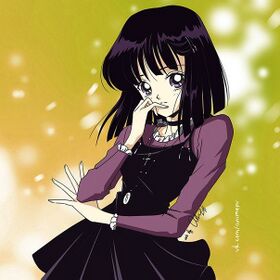Jocelyn Tran
Jocelyn Tran 陳黃幸福 | |
|---|---|
 | |
| Background information | |
| Birth name | Trần Hoàng Hạnh Phúc |
| Also known as | Not-Gothic Pianist |
| Born | 20 May 1975 Tuy Khoang, Lang Lãnh Province, Quenmin |
| Genres |
|
| Occupation(s) |
|
| Instruments | Piano |
| Years active | 1993–present |
| Labels | Cyprine, Moon Crater Records, Readymade Records |
| Associated acts | |
| Website | www |
Jocelyn Tran (born Trần Hoàng Hạnh Phúc; May 20, 1975) is a Quenminese classical and concert pianist, arranger, and composer who gained fame as being the youngest pianist to win first place in the National Giang Sái Minh Khải and Franz Liszt Competitions, making arrangements from contemporary music, and writing complex, virtuosic compositions of her own.
Early Life
Jocelyn was born to Trần Sắc Giang and Hoàng Thị Quý Tuyên, of whom belong to a family of musical intellectuals. She was described by her parents as being an intelligent and shy girl. At the age of four, she grew fond of the sound of her father practicing piano in the afternoon, and much to the reluctant eagerness of latter, she would even sit on the carpet and request for him to play new songs for her. Eventually, she was convinced by her father to teach her how to play, to which she took with much enthusiasm. Every evening after dinner, she would learn pieces under her father's guidance until the age of six, in which at that time, her parents decided that she would study under another teacher, due to much work that they have to do. At first, she refused to take their proposition, even to the point of crying, but after realizing the situation they were enduring, she subsequently agreed.
When she was eight years old, she moved to a more advanced teacher due to her talent being above beginner level. Despite possessing talent, she had a hard time coping with his pace of teaching. As she recalled in her interview on 60 Minutes...Well, Sort Of, Jocelyn described him possessing a "vehement sense of passion when it comes to classical music," and that she would "cringe everytime he voiced himself out like that." At times, when she would make mistakes more than twice, she would breakdown after given harsh criticism, even to point of giving up piano. During the same interview, she exactly remembered one criticism from him that had caused her a substantial amount of stress when she was ten, which was "I can't believe it! You're one talented girl, but yet, you cannot master this piece [Transcendental Etude No. 12 - Chasse Neige] after a two weeks of practice?! Are you actually pulling off a joke here?! At this rate, you'll never showcase your deeper talent to the crowd if you can't express yourself and play this well! I'm tired, Jocelyn. You're a waste of space; worst yet, a waste of talent. I'm sorry, but I not continuing today's lesson. You're done." This moment made her quit taking lessons, and she would never touch the instrument for about a year.
That part of her life was expressed as a "year of depression." Jocelyn would often scold and condemn herself for being what her previous teacher described her to be, even hitting herself on occurrences, which exacerbated her mental state. Her parents had trouble cheering her up, often at times leaving Jocelyn requesting that they leave her alone to do her things or denying their proposals for doing fun things.
In 1993, she further developed her passion at the Kontin Conservatory of Music.
Career
Jocelyn Tran | |
|---|---|
| Alma mater | Kontin Conservatory of Music |
| Awards | Lang Lãnh Provincial Pianist Competition
National Giang Sái Minh Khải Competition
National Franz Liszt Competition
|
In 1991, she won first place in the National Giang Sái Minh Khải Competition prior to her diligent and passionate playing of The Banjo, Op. 15., Trống Thùng, Op.2, D. 13, and Cây Chuối in C Minor, Op.5, D. 14.